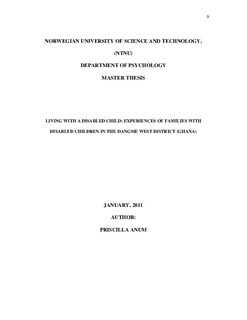| dc.description.abstract | The general observation of the plight of disabled children and their families in Ghana necessitated this study, which aimed to delve into the experiences of families with disabled children in Ghana as a means of bringing to light what it means to have and live with a disabled child in the Ghanaian context. Using semi-structured interviews as guide, participant observations, informal conversations and narrative analysis, this study explored the experiences of four families with disabled children in the Dangme West District. It explored their experiences of living with the child, drawing on the practical, social, and economic challenges encountered, how they are coping in the face of these challenges, and their perceptions as regard the future of the child. Background data was gathered from institutions and the various communities of the participating families. The focus was mainly on the main caregivers, who in this case happen to be the mothers, but other members of the family were also engaged in informal conversations. Findings show that these families experience stigma, financial strain, strain on family relationships, and lack of institutional support. These findings were discussed mainly through the lenses of the two sub-models of the social model of disability; the cultural model which shed light on the stigma and stigmatization that these families experienced and the structural model, within which the lack of institutional support was discussed. It was recommended that much more need to be done by disability organizations and government institutions to educate the Ghanaian society on the causes of disability through the mass media and also remove negative images of disabled people from the media. Other suggestions include the need for early intervention structures, resourcing of schools and preschools that can accommodate disabled children, and the establishment of parent support groups. | nb_NO |
